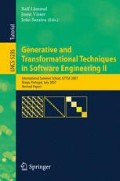Abstract
As domain-specific languages (DSLs) permeate into mainstream software engineering, there is a need for economic methods for implementing languages. Following up on a paper with a similar title, this paper focuses on dynamically typed languages, covering issues ranging from parsing to defining and staging an interpreter for an interesting subset of Dr. Scheme. Preliminary experimental results indicate that the speedups reported in previous work for smaller languages and with smaller benchmarks are maintained.
Supported by NSF CCR SoD 0439017, CSR/EHS 0720857, and CCF CAREER 0747431.
Access this chapter
Tax calculation will be finalised at checkout
Purchases are for personal use only
Preview
Unable to display preview. Download preview PDF.
References
Consel, C., Danvy, O.: For a better support of static data flow. In: Hughes, R.J.M. (ed.) FPCA 1991. LNCS, vol. 523, pp. 496–519. ACM Press, Cambridge (1991)
Danvy, O., Malmkjaer, K., Palsberg, J.: Eta-expansion does the trick. Technical Report RS-95-41, University of Aarhus, Aarhus (1995)
Friedman, D.P., Want, M., Haynes, C.T.: Essentials of Programming Languages. MIT Press, Cambridge (2003)
Hutton, G., Meijer, E.: Monadic Parsing in Haskell. Journal of Functional Programming 8(4), 437–444 (1998)
Oregon Graduate Institute Technical Reports. P.O. Box 91000, Portland, OR 97291-1000, USA, ftp://cse.ogi.edu/pub/tech-reports/README.html
Sabry, A.: The Formal Relationship between Direct and Continuation-Passing Style Optimizing Compilers: A Synthesis of Two Paradigms. PhD thesis, Rice University (August 1994)
Taha, W.: Multi-Stage Programming: Its Theory and Applications. PhD thesis, Oregon Graduate Institute of Science and Technology (1999) Available from [5]
Taha, W.: A gentle introduction to multi-stage programming. In: Lengauer, C., Batory, D., Consel, C., Odersky, M. (eds.) Domain-Specific Program Generation. LNCS, vol. 3016, pp. 30–50. Springer, Heidelberg (2004)
Thiemann, P.: Correctness of a region-based binding-time analysis. In: Mathematical Foundations of Programming Semantics, Thirteenth Annual Conference, Pittsburgh, Pennsylvania, Carnegie Mellon University, p. 26. Elsevier, Amsterdam (1997)
Wadler, P., Taha, W., MacQueen, D.B.: How to add laziness to a strict language withouth even being odd. In: Proceedings of the 1998 ACM Workshop on ML, Baltimore, pp. 24–30 (1998)
Author information
Authors and Affiliations
Editor information
Editors and Affiliations
Rights and permissions
Copyright information
© 2008 Springer-Verlag Berlin Heidelberg
About this chapter
Cite this chapter
Taha, W. (2008). A Gentle Introduction to Multi-stage Programming, Part II. In: Lämmel, R., Visser, J., Saraiva, J. (eds) Generative and Transformational Techniques in Software Engineering II. GTTSE 2007. Lecture Notes in Computer Science, vol 5235. Springer, Berlin, Heidelberg. https://doi.org/10.1007/978-3-540-88643-3_6
Download citation
DOI: https://doi.org/10.1007/978-3-540-88643-3_6
Publisher Name: Springer, Berlin, Heidelberg
Print ISBN: 978-3-540-88642-6
Online ISBN: 978-3-540-88643-3
eBook Packages: Computer ScienceComputer Science (R0)

